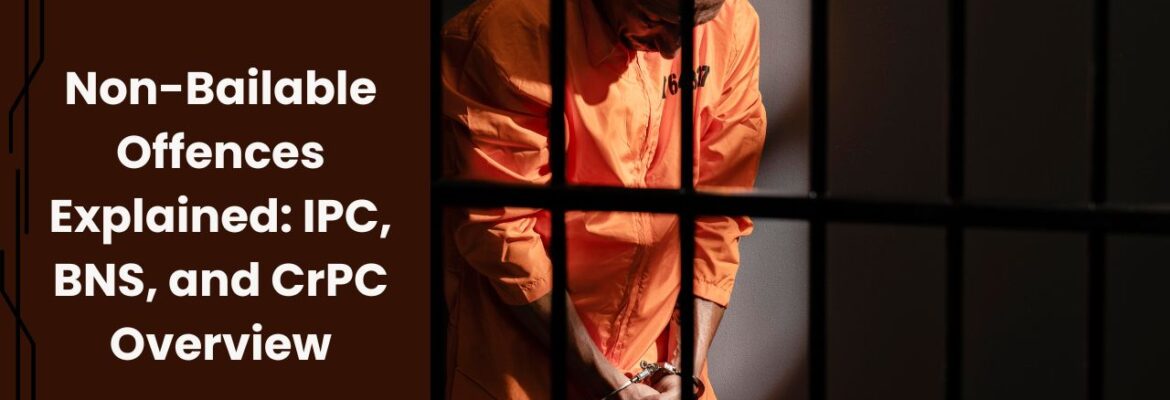Non-Bailable Offences Explained: IPC, BNS, and CrPC Overview

Posted Jun 2025
Non-bailable offenses can be defined as serious crimes or severe cases for which bails are not approved easily by the court, and after committing these severe crimes, asking to grand for bail is not correct, as the police generally do not permit bail to be approved for non-bailable crimes.
In the Indian legal system, the bail system has a significant impact on determining whether a person facing criminal charges can be granted release from custody while pending trial. Additionally, finding the right criminal lawyer in Delhi also creates a big impact while handling criminal charges.
What is a Non-Bailable Offence?
A non-bailable offense can be described as a process where bail has not been granted by the court, as it consists of a severe crime. Here, the accused needs to request bail from the court. After that, the judge will decide if it is possible to allow bail for such factors as the type of crime, available proof, and the possible danger to society or investigation.
Examples of Non-Bailable Offenses include:
- Unlawful killing (Section 302 of IPC)
- Assault (Section 376 of IPC)
- Abduction (Section 364 of IPC)
- Forced Labor (Section 370 of IPC)
- Misconduct (Under the prevention of corruption act)
- Armed force or theft (Section 394 of IPC)
Legal Implications of Being Charged with a Non-Bailable Offence
Being charged with a non-bailable offense in India has serious legal penalties, as these charges particularly involve serious crimes. Here are some key implications:
Challenges in securing bail
Unlike Bailable offenses where bail is given automatically, a non-bailable offense requires the accused to request, and the court decides based on factors like the seriousness of the crime and the risks of the investigation.
Extended detention period
The accused may stay in custody for a longer period, like for many months or years, especially in complex cases.
Effect on Legal Processes
A non-bailable offense shows the seriousness of the crime, which can result in strict legal proceedings and affect the court’s decision on punishment and the risk the accused poses to society.
Harm to reputation
Being charged with a non-bailable offense can harm the accused’s reputation, even if they are cleared, and lead to social prejudice and social consequences.
Procedure for Bail in Non-Bailable Offense
Bail can be approved in a Non-Bailable offense by the courts. Here are some procedures for a Non-bailable offense:
Petition for bail
The lawyers must file a petition in court and this can be completed before the higher court depending on the seriousness of the crime and the steps involved in the legal process.
The court’s decision
The court has all the privileges to decide whether to grant bail in case of non-bailable offense cases. It consists of various factors like what type of crime is involved in the case, proof, and the criminal record of the person.
Review of the bail application
The court has the right to schedule a hearing for bail application. Both the opposite parties will present their arguments. The accusation can make an argument against bail by keeping in mind the seriousness of the case.
Factors Noticed by the Court
Some factors noticed by the court include the seriousness of the crime, the chance of fleeing, and the criminal background.
Conditions for Bail
If the court approves bail, some conditions need to be noted, including handing over the passport, regular check-ins at the police station, limiting travel, and securing a security bond.
IPC and Bhartiya Nyaya Sanhita (BNS) Sections for Non-bailable Offences
With the introduction of the Bhartiya Nyaya Sanhita (BNS), 2023, replacing the Indian Penal Code (IPC), 1860, many provisions for non-bailable offenses have been restructured. Below is a comparison of key non-bailable offenses under both the IPC and the BNS:
1. Offences Against the State & National Security
- IPC:
- Section 121 – Waging war against the Government of India
- Section 124A – Sedition (now removed in BNS)
- BNS:
- Section 113 – Waging war against the Nation
- Sedition replaced with Section 150 (acts endangering sovereignty, unity, and integrity of India)
2. Offences Against the Human Body
- IPC:
- Section 302 – Murder
- Section 304 – Culpable homicide not amounting to murder
- Section 307 – Attempt to murder
- Section 376 – Rape
- Section 326 – Voluntarily causing grievous hurt by dangerous weapons
- BNS:
- Section 101 – Murder
- Section 103 – Culpable homicide not amounting to murder
- Section 108 – Attempt to murder
- Section 63 – Rape
- Section 117 – Causing grievous hurt with dangerous weapons
3. Offences Against Women and Children
- IPC:
- Section 354 – Assault or criminal force to woman with intent to outrage her modesty
- Section 376 – Rape
- Section 498A – Cruelty by husband or relatives
- BNS:
- Section 75 – Molestation of a woman
- Section 63 – Rape
- Section 85 – Cruelty by husband or relatives
4. Offences Related to Kidnapping & Trafficking
- IPC:
- Section 363 – Kidnapping
- Section 370 – Human trafficking
- BNS:
- Section 128 – Kidnapping
- Section 129 – Human trafficking
5. Economic and White-Collar Crimes
- IPC:
- Section 406 – Criminal breach of trust
- Section 420 – Cheating and dishonestly inducing delivery of property
- BNS:
- Section 316 – Criminal breach of trust
- Section 317 – Cheating and fraud
When Bail can be granted in non-bailable offenses
Bail can be granted in non-bailable offenses under the Bharatiya Nagarik Suraksha Sanhita (BNSS) or the Criminal Procedure Code (CrPC). The decision to grant bail is at the discretion of the court.
BNSS
- Section 480 of the BNSS governs bail for non-bailable offenses.
- The court can grant bail if there are reasonable grounds to believe the accused is not guilty.
- The court can also grant bail if the accused is a child, a woman, sick, or weak.
- The court can grant bail for any special reason it finds just and proper.
CrPC
- Section 437 of the CrPC governs bail for non-bailable offenses.
- The court can grant bail if the accused is under the age of 16, a woman, or sick or infirm.
- The court can also grant bail if it is satisfied that it is just and proper to do so for any other special reason.
Challenges of Non-Bailable Offences in Indian Legal System
Several challenges occur in the Indian Legal System concerning Non-Bailable Offenses. Some of the challenges are discussed below:
- Rigid and often Inconsistent Nature: Non-bailable offenses, defined under Sections 437 and 439 of the Code of Criminal Procedure (CRPC), 1973, often result in a lack of judicial discretion in granting bail.
- Infringement on Individual Freedom: Article 21 of the Indian Constitution guarantees the right to life and personal liberty.
- Abuse of Authority by Law Enforcement Officials: False charges under serious non-bailable offenses (such as IPC Sections 307, 376, and 498A) lead to unwarranted arrests and legal abuse.
- Prolonged Legal Proceedings: Courts in India are overburdened, leading to prolonged trials and excessive pre-trial detention.
Tips to Find a Criminal Lawyer in Delhi for Non-Bailable
When you are facing criminal charges, finding the right legal representation is critical to protecting your rights and ensuring a fair trial. Here are some practical tips to find a criminal lawyer who can handle your case effectively:
- Look for Specialization: Always choose a lawyer who specializes in criminal law. A general practitioner may not have the deep understanding of criminal statutes and procedures that your case demands.
- Check Experience and Track Record: Experience matters significantly in criminal cases. Look for a criminal lawyer in Delhi who has successfully handled cases similar to yours and has a good reputation in the courts.
- Verify Credentials and Bar Association Registration: Ensure the lawyer is registered with the Bar Council of Delhi and holds valid credentials.
- Client Reviews and Testimonials: Reading reviews or asking for client references can give you insight into the lawyer’s professionalism, communication style, and success rate.
- Personal Consultation: Schedule a meeting to evaluate how the lawyer communicates and whether they are genuinely interested in your case. Comfort and trust play a vital role in legal matters.
Conclusion
After understanding all the topics at last, it is concluded that in India Non-Bailable offenses are considered to be serious crimes or cases, and for these serious offenses, bail is not easily granted by the court.
Complete Evidence and proper investigation by the police are the major processes involved in Non-Bailable offenses. There are many challenges and several sections that need to be remembered while understanding the Non-Bailable cases.
For more information about our legal services, please visit: https://www.chambersofmohitsingh.in/
Tags: Non-Bailable Offence

